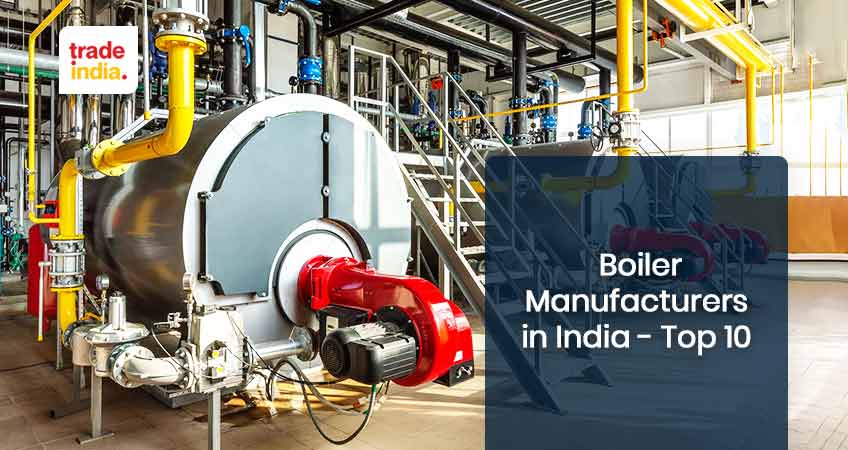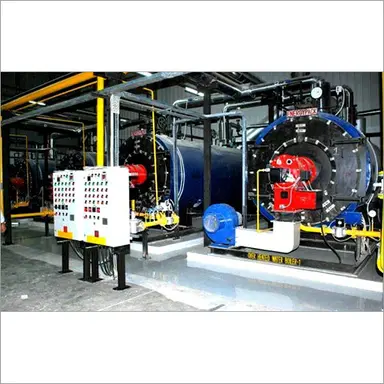Top 10 Reliable Boiler Manufacturing Companies in India

An integral part of the manufacturing and process industries of the world, boilers are compact chambers that generate steam from hot water through fuel combustion. They may include several tubes, a drum or shell, pipes, fittings, and mountings. Generally, boiler manufacturers ensure that their boilers work efficiently and reliably and adhere to safety guidelines.
Materials Required
To work efficiently, boilers need raw materials such as tubes, plates, pipes, pipe fittings, and valves. They also need alloy steel, carbon steel, and stainless steel to make their products reliable and durable.
What is the importance of a boiler?
A boiler produces hot water or steam. The hot water generated could be either used for domestic purposes or commercial heating. Steam boilers fulfill the function of generating steam to power turbines for electricity generation.
How does an industrial boiler work?
An industrial boiler is a vessel containing water that works to generate steam or hot water utilizing a source of fuel. From here, it passes on to several tubes that link up to many forms of industrial equipment. With steam energy, machinery can run effectively and economically.
Applications of steam generated by a boiler
Steam generated by a boiler serves the following purposes:
- Power generation for thermal power plants
- To heat buildings in a cold climate
- To carry out process work in industries
Steam generated by boilers serves the following industries:
- Pharmaceutical
- Breweries & Distilleries
- Power generation
- Refinery and petrochemicals
- Sugar and Jaggery
- Food & Beverage Processing Plants
- Milk Dairy
- Textile Manufacturing Facilities
- Commercial Laundry Facilities
- Rice Mill
Major components of a best boiler system
A boiler is the chief component of a system that generates hot water or steam. It includes the feedwater system, fuel supply, combustion air system, and exhaust gases venting system.
Features of a Good Steam Boiler
The features of a good boiler system are:
- The capability of producing large quantities of steam
- The rate of steam generated should match its demand.
- The boiler should be reliable in operation.
- It should be space-saving or compact.
- It must start up quickly.
- It can be transported easily and quickly.
- It should have a basic design that enables inspection and repair
- The steam must be generated at minimum cost.
5 Factors to Consider When Choosing an Industrial Boiler
Choosing an industrial boiler is a responsible job. After all, you don’t want to buy an expensive piece of machinery only to find it’s unsuitable for your needs. That’s why we’ve come up with this short but vital list of factors to consider when you’re shopping for an industrial boiler:
- Energy Efficiency
This is the first factor that you should consider when buying an industrial boiler. Look up energy labels and check the machine’s monthly energy performance. Make a shortlist of the best boiler manufacturers in India and engage with them for the best of their range.
Ask the boiler manufacturing company in India you’re dealing with for important information such as the estimated efficiency rating for a particular package. Check out the price and evaluate whether it’s worth the cost. Also, find out the projected use of energy for life to help you understand your maintenance costs.
- Operational Costs
Don’t go solely by the upfront expenses of the machine but do find out its operational costs. Taking fuel costs into account, manufacturers can calculate an estimated cost to run the boiler.
- Set Up Costs
Before closing the deal on a boiler, check out the amount of work to be done to install a boiler. Ask for easy-fit components and lightweight designs that will enable you to maintain and operate the boiler system well.
- Easy Availability of Replacement Parts
If a manufacturer has easy access to spare parts, you should choose to go with him.
- Buy a Boiler with Safety Features
Apart from the technical aspects, the safety of the people handling the system should also be considered. Often, boiler systems can overheat and cause the presence of high-pressure steam. This can be dangerous, so ensure that the boiler you’re looking at is of a high standard.
Top 10 Best Boiler Manufacturing Companies In India (2022)
The boiler manufacturing industry in India is vibrant and robust. Many boiler manufacturers in India serve different verticals and render the process time-saving.
Here is a list of boiler manufacturers in India that do impeccable work across a variety of industries:
#1. Forbes Marshall
One of the leading companies in industrial boiler production, Forbes Marshall uses state-of-the-art technology and experienced professionals to deliver the highest quality results. It has large manufacturing plants all over India.
#2. Thermax India Limited
Regarded as one of the top and oldest industrial steam boiler manufacturers in India, Thermax India Limited was set up in 1980 in Pune, Maharashtra. It is known for its superlative product quality. Over the years, it has built a strong international presence in over 75 countries.
#3. Agni Boilers Private Limited
Agni Boilers Private Limited (ABPL) provides heating equipment to customers. Product innovation and development have been the focus areas of this company. Today, apart from boilers, it manufactures IBR and non-IBR products, heat exchangers, hot water generators, thermic fluid heaters, pressure vessels, and much more.
#4. KCP Group
This publicly owned company produces steam boilers and hot water boilers. Their superior design, high-efficiency boilers, and smooth and durable operation make them one of the best in the industry. The KCP Group’s boilers find application in the food and beverages industry, paper, textiles, chemicals, and power generation.
#5. Industrial Boilers Limited
Industrial Boilers Limited is a solid company with its roots firmly entrenched in the boiler industry. It has an ISO 9001:2000 certification to its name and continues to build on its wealth of experience for many years. So far, it has delivered 5000 steam turbines and 6000 boilers to customers. Its portfolio of products includes packaged oil, husk, gas and wood-fired boilers, fluidized bed combustion boilers, and steam turbines. This company was established in 1974 in Mumbai, Maharashtra.
#6. Cheema Boilers
No list of boiler manufacturers in India can be complete without a mention of Cheema Boilers. Set up in 1999 in Ropar, Punjab, it serves clients from a variety of verticals, such as food, packaging, rubber, solvents, pharmacy, and rice, among others.
#7. Thermodyne Engineering Systems
Thermodyne Engineering Systems believes in providing efficient boilers that also cut costs for clients. It serves the power sector and steam processing industries by delivering customized heating solutions, efficient boilers, and consultancy on energy. In a magical span of barely 15 years, it has notched up a roster of impressive clients like Reliance, L&T, Metso, Merino industries, and Goodluck. Their product list includes process boilers, instatherms, biomass boilers, powertherms, thermair, and other related products.
#8. Southern Boilers and Equipment Private Limited
In its 27 years of existence, Southern Boilers has achieved phenomenal success. It manufactures steam and hot water boilers, and thermal fluid heaters. Its plant is situated in Kakkalur, Chennai.
#9. Siston India Private Limited
Established in 1978, this boiler manufacturer has risen to the top of the list of best Indian boiler manufacturers. It has a nationwide presence and its corporate office is in Mumbai, Maharashtra.
#10. Aero Therm Systems
One of the prominent boiler manufacturers in India, Aero Therm Systems has over four decades of experience in this field. It has come a long way since its inception in 1978 when it was known as Aeromatic Corporation. In fact, in 1974, it pioneered the vacuum pump system. Today, with the same resolve, it provides robust applications with inbuilt technical expertise to discerning customers.
Conclusion
Several top boiler manufacturers currently offer excellent services and have acquired significant recognition for it, using cutting-edge technology and sophisticated equipment. So, it’s not surprising that they experience phenomenal success in their field.
FAQs: Boiler Manufacturers
Q. What is an industry boiler?
Ans. An industrial boiler is a vessel that holds water. It generates heat using either coal, gas, or oil. From here, it is sent to several tubes that are linked with the industrial equipment. With steam energy, industrial machinery can run cost-effectively and efficiently.
Q. How do industrial boilers work?
Ans. Industrial boilers are vessels that contain water. This water, when turned to steam, generates heat using a fuel source. In this form, it is sent through tubes that connect to industrial equipment. The steam energy produced through the boilers is used to operate industrial machinery, making these plants cost-effective.
Q. What is a boiler made of?
Ans. Alloy steel is used to make industrial boilers since it can withstand high pressure and temperature. Generally, there are two types of steam boilers: fire-tube and water-tube types.
Q. How long does an industrial boiler last?
Ans. Though these boilers have a 15-year life, as the years go by, they do develop problems, particularly if they haven’t been maintained professionally.
Q. What is an industrial boiler used for?
Ans. Industrial boilers are used to produce steam that is useful for process and space heating and to generate mechanical electricity. They are used for industrial, commercial, utility purposes, and much more. Boilers have several applications such as creating paper and pulp, processed food, electricity, etc.
Q. What fuel is used in boilers?
Ans. Primarily, boiler fuels include gas, coal, and oil.
Q. What are the main parts of an industrial boiler?
Ans. The key features of an industrial boiler include:
- Burner
- Combustion chamber
- Exhaust stack
- Heat exchanger
- Controls
Q. What is the most important part of a boiler?
Ans. A boiler’s safety valves are its most important feature. It relieves internal pressure if several consecutive failures are experienced within the system.
Explore More:


